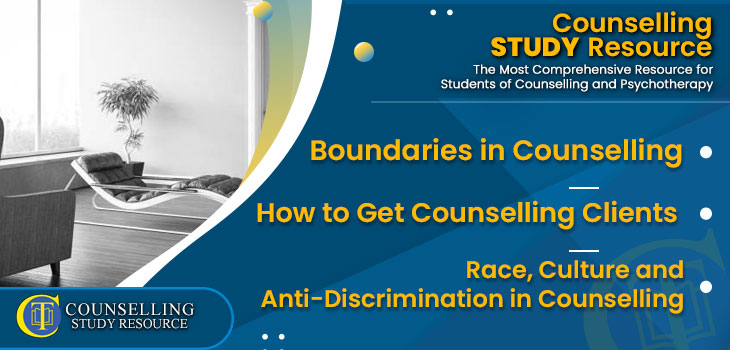238 – How to Get Counselling Clients
Boundaries in Counselling – Race, Culture and Anti-Discrimination in Counselling
In Episode 238 of the Counselling Tutor Podcast, your hosts Rory Lees-Oakes and Ken Kelly take us through this week’s three topics:
- In ‘Theory in Practice’, we’ll look at boundaries in counselling.
- Then in ‘Practice Partner’, Rory and Ken discuss how you might go about getting counselling clients – or more importantly, how clients might find you.
- And lastly in ‘Practice Matters’, Rory is speaking with Mamood Ahmad about race, culture and anti-discrimination in counselling.
Boundaries in Counselling [starts at 02:46 mins]
Counselling Foundations is sponsored by
Counselling Skills Academy
Learn counselling techniques by seeing counselling skills used in real sessions by qualified therapists.
Real sessions - real-life presentations - real skills.
Boundaries are an important part of your work as a counsellor – both for you and your client.
The key points of this discussion include:
- In your position as counsellor, you have power. Boundaries are therefore put in place as a way to stop harm or damage to either you or your client.
- There are different types of boundaries:
- Client facing boundaries e.g. your working hours and when you're willing to respond to clients.
- Time boundaries – keeping sessions to their set and contracted time.
- Legal and ethical boundaries.
- Touch boundaries – if instigated by the client and is purely for the client, it is up to you whether you allow this and where you set the boundary.
- Boundaries are fixed; they're not something moveable.
- Boundaries require mutual understanding – they're not just for you.
- Is someone presenting with something you don’t feel confident working with? Can you give this client the best service? Know your own boundaries and capabilities.
A handout on Boundaries in Counselling is available for download in the green button above.
How to Get Counselling Clients [starts at 21:45 mins]
When it comes to opening your own practice, you will need to get counselling clients. In this section, Rory and Ken discuss a few ways you may go about obtaining these clients:
- Counselling directories – these will allow you to advertise your services, but it’s a crowded market with lots of other counsellors doing the same thing. If you have a specialism, this will help you to stand out and narrow down the competition.
- Local referrals – is there a local agency you can create a referral relationship with?
- Building relationships and networking is an important part of getting counselling clients.
- The client has a choice to make when looking for a counsellor – it is important to have a digital presence (e.g. website) so potential clients can learn more about you and how you work.
- Another option to look into to get counselling clients could be paid media.
Race, Culture and Anti-Discrimination in Counselling [starts at 40:55 mins]
The National Counselling Society is proud to sponsor Practice Matters.
NCS are really excited to have launched their Children and Young People Therapist Register for counsellors working with the younger age group.
In this week’s ‘Practice Matters’, Rory speaks with Mamood Ahmad about race, culture, and anti-discrimination in counselling.
The main points of this discussion include:
- Without an understanding of the clients culture or ‘otherness’, we won't be able to fully see the whole of the client, or meet them where they're at.
- As Rory quotes, ‘the client can only go as far as the therapist has gone themselves.’
- Lots of different things make up a person: their upbringing, culture, race, and experiences.
- Everybody is the other – no one has had the exact same experience you have.
- Seek training in how to work with clients of differing cultures etc. so that you can be best in service of your clients.
- A question to think about: can you write an experience where power has been used against you?


